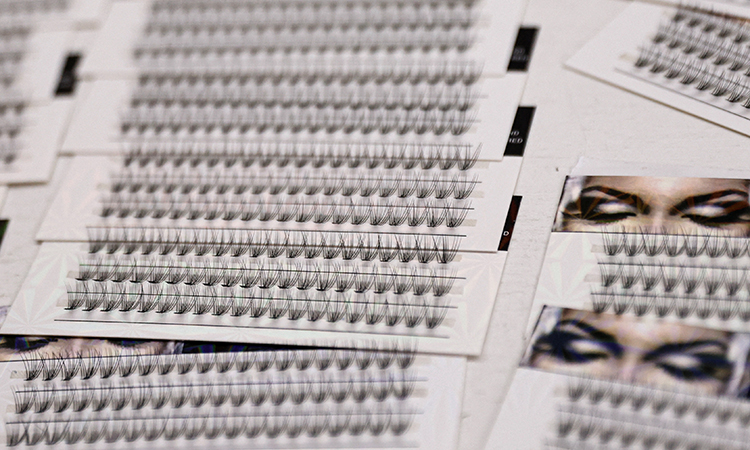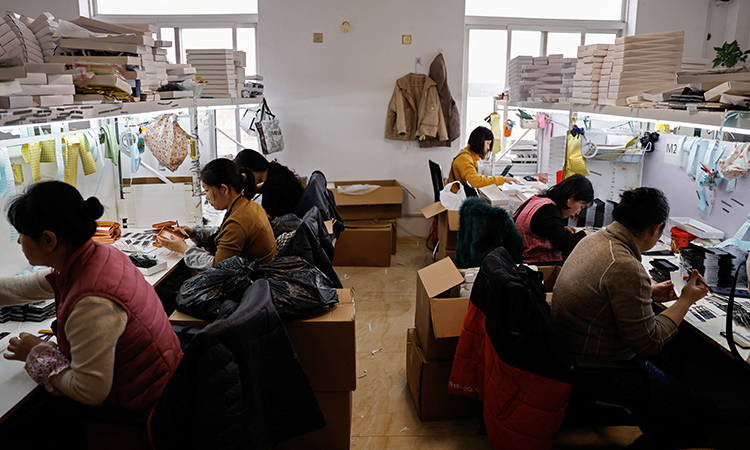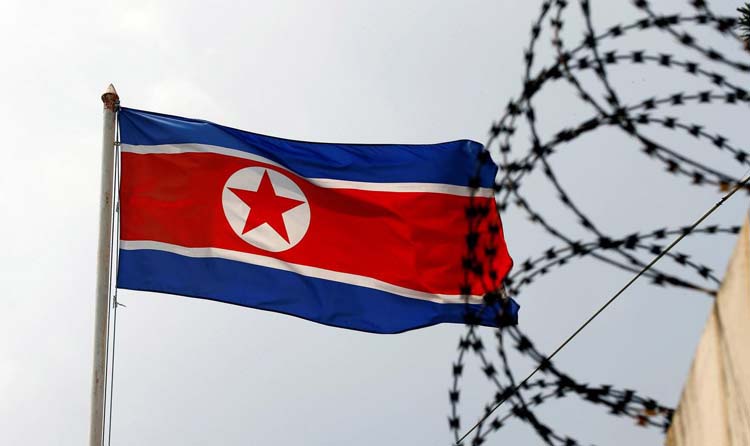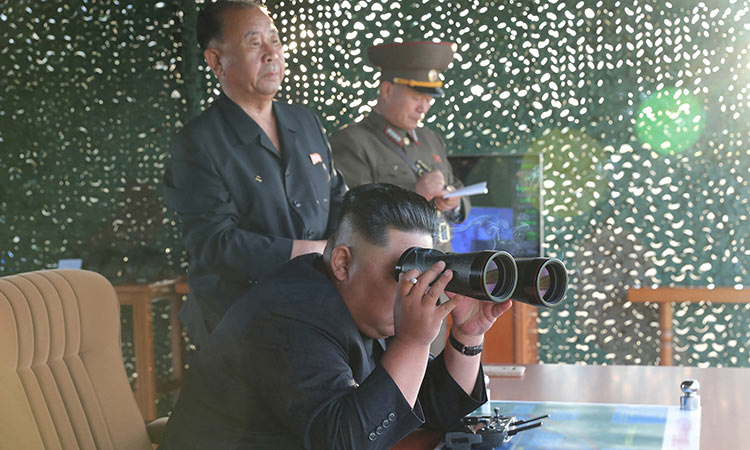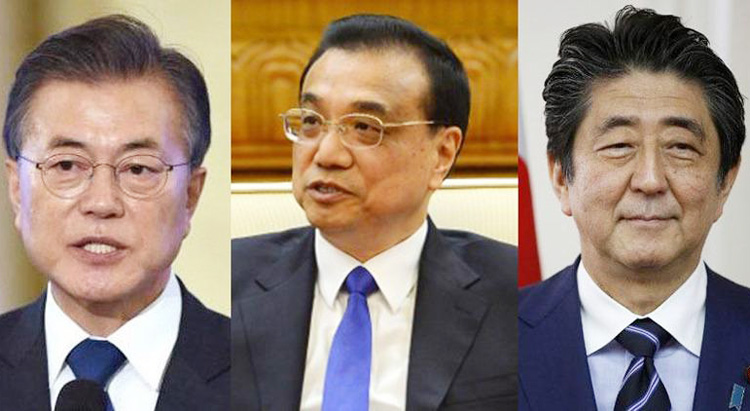How North Korean eyelashes make their way to West as ‘made in China’
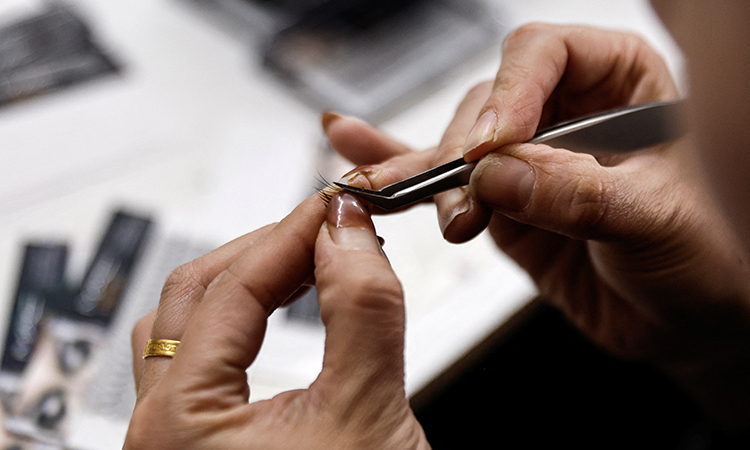
A worker works on a production line manufacturing false eyelashes at a workshop in Pingdu, China. Reuters
Millions of dollars in sales of North Korean false eyelashes — marketed in beauty stores around the world as "made in China" — helped drive a recovery in the secretive state's exports last year.
The processing and packaging of North Korean false eyelashes — openly conducted in neighbouring China, the country's largest trading partner — gives Kim Jong Un's regime a way to skirt international sanctions, providing a vital source of foreign currency.
Reuters spoke to 20 people — including 15 in the eyelash industry, as well as trade lawyers and experts on North Korea's economy — who described a system in which China-based firms import semi-finished products from North Korea, which are then completed and packaged as Chinese.
The finished eyelashes are then exported to markets including the West, Japan and South Korea, according to eight people who work for companies directly involved in the trade.
Some of the people spoke on condition that only their last names be used because they were not authorised to talk to the media. North Korea has long been a major exporter of hair products like wigs and false lashes, which enable people to avoid the hassle of mascara and to achieve a dramatic look. But exports tumbled during the COVID-19 pandemic, when North Korea slammed its borders tightly shut.
Significant trade in North Korea-made lashes via China resumed in 2023, according to customs documents and four people in the industry.
Chinese customs data showed that North Korea's exports to China more than doubled in 2023, when borders reopened. China is the destination for nearly all of North Korea's declared exports.
Wigs and eyelashes comprised almost 60% of declared North Korean exports to China last year. In total, North Korea exported 1,680 tonnes of false eyelashes, beards and wigs to China in 2023, worth around $167 million.
False eyelashes are pictured on a table at a workshop of Monsheery in Pingdu, China. Reuters
In 2019, when prices were lower, it exported 1,829 tonnes at a value of just $31.1 million.
The US State Department and international experts estimate that North Korea seizes up to 90% of foreign income generated by its citizens, many of whom live in poverty. Reuters was unable to determine how much of the revenue from eyelash sales flowed back to Kim's government, or how it was used.
"We have to assume that ... millions of dollars every month that North Korea is making through this eyelash trade is being used for the Kim Jong Un regime," said Seoul-based sanctions lawyer Shin Tong-chan. His view was corroborated by two other international trade experts, though none provided specific evidence.
North Korea did not respond to requests for comment for this story sent to its UN missions in New York and Geneva, its embassy in Beijing and its consular office in the Chinese border city of Dandong.
A spokesperson for the Chinese Foreign Ministry said Beijing and Pyongyang "are friendly neighbors" and that "normal cooperation between the two countries that is lawful and compliant should not be exaggerated."
UN and US sanctions
Since 2006, the United Nations Security Council has sought to stall Pyongyang's nuclear weapons programme through nearly a dozen sanctions resolutions that restrict its ability to trade products such as coal, textiles and oil. It also imposed strict restrictions on North Koreans working abroad.
Sanctions passed by the Security Council are supposed to be enforced by UN member states — all of whom are legally bound to implement them — using local legislation.
But there is no direct ban on hair products, so trading false eyelashes from North Korea does not necessarily violate international law, three sanctions experts told Reuters.
Reuters presented its findings to the Chinese Foreign Ministry, which said it was "not aware of the circumstances" described but that any alleged violations of UN sanctions are "completely without foundation".
Japan's foreign ministry did not comment on Reuters' findings, but said Tokyo, which bans trade with Pyongyang, would continue to consider "the most effective approach" toward North Korea. The European Union's diplomatic service did not return requests for comment on North Korean-made eyelashes being sold in its jurisdiction.
The United States has since 2008 separately expanded its own measures against North Korea, which include sanctions on any company stocking or selling products whose sales fund the Kim regime: a restriction that also applies to non-American firms using the US dollar.
But there are practical and political limitations on Washington's ability to enforce such sanctions unilaterally on entities such as foreign businesses that have minimal exposure to the US financial system and don't sell primarily to American clients, according to two international sanctions lawyers.
Workers at a production line manufacturing false eyelashes at a workshop of Monsheery in Pingdu, China. Reuters
A US Treasury spokesperson said it "actively enforces the range of our broad North Korea sanctions authorities against both US and foreign firms" and would "continue to aggressively target any revenue generation efforts" by Pyongyang.
The Treasury also referenced its nearly $1 million settlement with e.l.f. Cosmetics in 2019 over allegations that the US-based firm inadvertently sold false eyelashes containing materials from North Korea.
e.l.f.'s parent company said in a 2019 filing that it discovered two suppliers had used North Korean materials during a "routine, self-administered audit" and that it quickly addressed the issue, which it determined was "not material."
The company, which has since stopped selling false eyelashes, reiterated its commitment to making products legally and responsibly in a statement to Reuters for this story.
Reuters was unable to establish whether any Western companies are currently involved in the North Korean eyelash trade.
China's 'eyelash capital of the world'
The people involved in the industry said that Pingdu, an eastern Chinese town that bills itself the 'eyelash capital of the world', is a key node in the supply chain from North Korea.
Many Pingdu-based companies, such as Monsheery, package false eyelashes that are produced primarily by North Koreans, said Wang Tingting, whose family owns the firm, which exports products to the US, Brazil and Russia.
Wang said in an interview from her factory that North Korean goods had helped build Monsheery up from a small family workshop. The company was founded in 2015, corporate records show.
"The quality of the North Korean product is much better," said Wang, who said that she was not aware of any sanctions-related issues with using North Korean false eyelashes. She declined to name her international clients.
Others in Pingdu said they are conscious of the role sanctions play in the complicated distribution chain.
"If not for these sanctions, there would be no need for (North Koreans) to export through China," said Gao, who owns Yumuhui Eyelash.
Cui Huzhe, who represents a North Korean factory that works with a Chinese partner in a venture called the Korea-China Processing Joint Trading Company, said the North Korean firm sends semi-finished eyelashes to China, where they are sold to markets including the US, Europe, Japan and South Korea.
He declined to identify the two companies involved in the partnership or their clients. Subsequently, he couldn't be reached for comment on the sanctions implications.
Reuters
